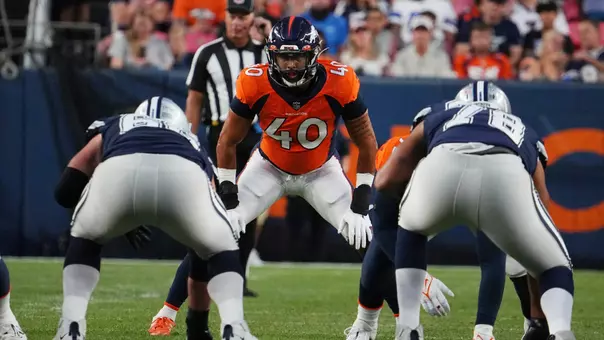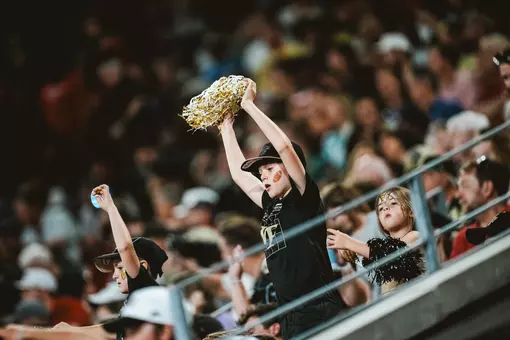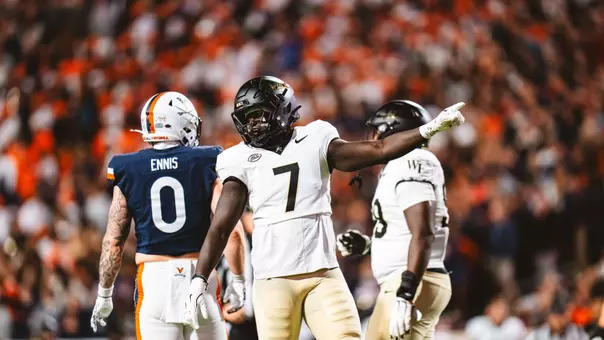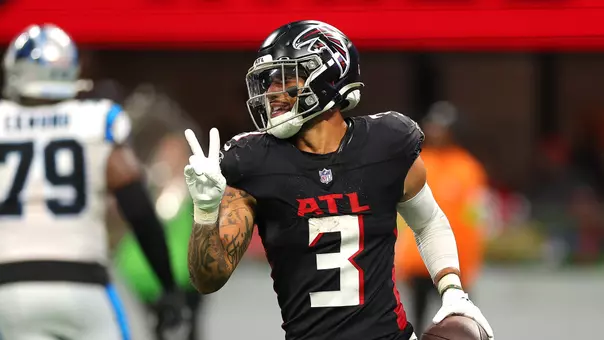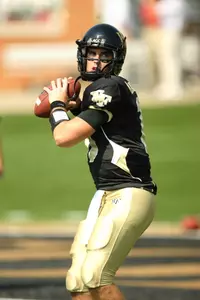
2003 Football Season Review
12/21/2003 12:00:00 AM | Football
Dec. 21, 2003
Complete Release in PDF Format![]()
![]() Download Free Acrobat Reader
Download Free Acrobat Reader
Updated Player Bios in PDF Format![]()
![]() Download Free Acrobat Reader
Download Free Acrobat Reader
Wake Forest Football
Season in Review
Record: 5-7, 3-5 ACC
National Rankings: Ranked for one week -- 20th by Associated Press and 21st in the ESPN/USA Today Coaches Poll for the week of Sept. 7.
Highlights: The Deacs opened the 2003 campaign with a 32-28 victory on the road at Boston College ... then returned home to defeat then 11th-ranked NC State the following week, its first win over a ranked opponent since 1999 ... WFU set a new record for home attendance, as an average of 28,273 fans passed through the gates for seven home games in 2003 ... RB Chris Barclay recorded a 1,000-yard season with a 1,192 yards on the ground, the second-best season total in school history ... three Deacs -- the most since 1992 -- were named first team All-ACC: OG Tyson Clabo, CB Eric King and P Ryan Plackemeier ... second-team selections included Barclay and OT Mark Moroz ... King was selected WFU's Most Valuable Player by a vote of his teammates.
Statistical Rankings: Wake Forest ranked among ACC leaders in the following categories (NCAA rankings in parenthesis): Rushing Offense 1st (19th)
Turnover Margin 1st (20th)
Least Penalized 2nd (N/A)
Punting 2nd (22nd)
Sacks Against 2nd (N/A)
Key Losses in 2004: OG Tyson Clabo, OT Mark Moroz, LB Kellen Brantley, FS Quintin Williams
Key Returners in 2004: WR Jason Anderson, RB Chris Barclay, B Caron Bracy, CB Eric King, C Blake Lingruen, P Ryan Plackemeier, QB Cory Randolph, LB Brad White
Deacons Close Out 2003 Season With 5-7 Mark
The Wake Forest football team fell one game short of becoming bowl-eligible for the third straight season, ending the 2003 season with a 5-7 overall record, 3-5 in ACC play.
After getting off to a 2-0 start with wins over Boston College and NC State, followed by a subsequent national ranking in early September, the Deacs dropped a close one to Purdue at home, 16-10. WFU went to 3-1 with a home victory over East Carolina, but then dropped two conference contests -- to Virginia and Georgia Tech -- to fall to 3-3.
A 42-13 rout of Duke gave the Deacons some momentum heading to Florida State, but WFU had a tough time with the sixth-ranked Seminoles. The Deacs fell 48-24 despite putting up more offense and points than any other FSU opponent at that point of the season.
Wake Forest returned to Groves Stadium to dominate Clemson in an impressive 45-17 victory, halting a four-game Tiger win streak in the series. Needing just one more victory to become bowl eligible, the Deacons themselves were shocked the next week, falling 42-34 to a North Carolina team in Chapel Hill that was previously winless in ACC play.
A chance to redeem themselves at home against UConn the following week failed to pan out as well. The high-flying Huskies, coming into Groves Stadium on a four-game win streak, had a lot to prove in their season finale, stomping on the Deacs, 51-17.
Wake Forest's last chance at a 6-6 season and a bowl-eligible record came at home against a hot Maryland team over Thanksgiving weekend. The Deacs gave a valiant first-half effort, taking an early 21-6 lead, but couldn't hang on as Maryland battled back for a 41-28 victory to end Wake Forest's season.
Five Demon Deacons Named All-ACC
Five Wake Forest players were named to the 2003 All-Atlantic Coast Conference Football teams, as announced by the league office in late November. Offensive guard Tyson Clabo, cornerback Eric King and punter Ryan Plackemeier were selected to the first team, while running back Chris Barclay and offensive tackle Mark Moroz picked up second-team honors.
Wake's three first-team selections are the most since four Demon Deacons were named first-team All-ACC in 1992. The school's five total selections this season equal the number of Deacs honored in 2001, which included one first-team selection and four second-teamers.
ACC champion Florida State and Georgia Tech each led the way with five first-team selections. Maryland and NC State each had four honorees, followed by Wake's three picks. Clemson and Duke had two selections each while Virginia had one.
Clabo's All-ACC selection marks the third straight year a Deacon guard has been named to the first team. King is the first Demon Deacon defensive back to earn first-team honors since A.J. Greene in 1987. Plackemeier received 56 first-team votes out of 63 ballots. He becomes the first Demon Deacon to be named first-team All-ACC as a sophomore since John Henry Mills received the first of his three consecutive first-team selections in 1990. He is also the fourth Wake Forest punter -- and first since 1988 -- to be tabbed all-conference.
Barclay becomes the third Deacon running back in four years to earn second-team All-ACC honors, while Moroz, an honorable-mention All-ACC pick last season, was named to the second-team and was the third-leading vote-getter at offensive tackle.
Clabo, King and Plackemeier, along with the rest of the All-ACC first team, were honored at the ACC Football Banquet on Monday, Dec. 1 in Atlanta, Ga.
Team Award Winners Announced At Post-Season Banquet
Wake Forest's 2003 team award winners were announced at the post-season banquet on Dec. 7. Senior offensive lineman Tyson Clabo received the Bill George Award, sophomore running back Chris Barclay received the Outstanding Back Award, and junior cornerback Eric King was named the team's Most Valuable Player for the 2003 campaign.
The Bill George Award is given annually to Wake Forest's standout lineman on either offense or defense in honor of George, the school's first All-American. A defensive tackle for the Deacs from 1948-51, George went on to an outstanding professional career, capped by his induction into the Pro Football Hall of Fame in 1974. Clabo, from Knoxville, Tenn., was the key cog of the Deacon offensive line this season, seeing action at every position but center. He graded out at a team-best 88 percent for the season, and averaged nearly nine knockdowns a game while helping WFU lead the ACC in rushing for the third straight season.
Barclay finished the season as the ACC's rushing leader, collecting 1,192 yards -- the second-best season total in school history. The Louisville, Ky., product recorded five 100-yard games and scored 12 touchdowns. His 243 rushing yards versus Maryland in the season finale was the fourth-best single-game rushing performance in school history.
Both the Bill George and Outstanding Back Awards were selected by the Deacon coaching staff. The Bill George Award has been presented every year since 1964, while the Outstanding Back is an award started by head coach Jim Grobe and his staff in 2001.
King, from Woodstock, Md., was named the Deacons' MVP by a vote of his teammates. He is the second straight defensive player to earn the honor, following Calvin Pace's selection a year ago. King led the ACC in passes defended this season with 18, including 15 pass break-ups and three interceptions. He also had three forced fumbles, two fumble recoveries and 59 tackles, including 49 solo stops. His 85-yard interception return for a touchdown against Clemson was the second-longest in school history.
Quartet of Deacs Invited To All-Star Games
Four Demon Deacon seniors -- linebacker Kellen Brantley, offensive guard Tyson Clabo, senior offensive tackle Mark Moroz and senior free safety Quintin Williams -- have been selected to play in post-season all-star games. Brantley, Moroz and Williams have been invited to the Blue-Gray All-Star Classic in Troy, Ala. The first post-season all-star game of the season, this year's Blue Gray Classic takes place on Thursday, Dec. 25 and is slated for a 3:00 p.m. kickoff on ESPN2.
The Blue Gray Classic returns this year after a one-year hiatus and this year's game, the 65th Blue Gray Classic, will be played at Movie Gallery Stadium on the Troy State University campus.
Head coaches for this year's game include Joe Novak of Northern Illinois, Marshall's Bob Pruett, Guy Morriss of Baylor, and North Carolina's John Bunting.
As previously announced, Clabo will play in the 79th annual East-West Shrine Game. Clabo is a member of the East roster, which will be coached by Pittsburgh's Walt Harris. UNLV's John Robinson will guide the West squad. The all-star contest takes place January 10, 2004 at Pac Bell Park in San Francisco.
Brantley, Moroz and Williams are the 43rd, 44th and 45th Wake Forest players to participate in the Blue Gray Classic. Clabo is the 15th Demon Deacon to play in the East-West game, and the first since Bryan Ray in 2000.
Vallos Named Freshman All-America
Demon Deacon Steve Vallos was named a Freshman All-America by The Sporting News, the publication announced in December. Vallos, a redshirt freshman, earned a spot on the third team offensive line.
The 6-3, 302-lb. offensive guard started every game in 2003 -- one of just four offensive players and the only redshirt freshman on the team to do so. Vallos earned a season grade of 86.1 and averaged 8.2 knockdowns a game. He came on strong at the end of the season, tying a team season-high with 18.5 knockdowns versus North Carolina and grading out at a personal best 94 percent against UConn.
Getting Defensive
Wake Forest scored five defensive touchdowns this season -- one more than the number of such scores in the previous eight seasons combined. In fact, WFU scored more defensive touchdowns versus Clemson this year (two in the second quarter) than in all of the 2001 and 2002 seasons combined (zero in 2001, one in 2002).
Wake Forest's first touchdown of the 2003 season was scored by the Deacon defense, when Jamaal Argrow caused a QB fumble and Warren Braxton picked it up and had 53 yards of open field into the endzone at Boston College.
Braxton's TD was the first defensive score since the Duke game on Oct. 12, 2002, when Kellen Brantley had a 29-yard interception return for a TD. It was the first fumble recovery for a TD since Bryan Ray fell on the ball in the endzone versus UNC in 2000.
Brantley added the Deacs' second defensive TD of the season when, for the second straight year, he returned an interception against Duke. Eric King (85-yard INT return) and Jyles Tucker (forced fumble, 12-yard fumble return) tacked on the team's third and fourth defensive TDs against Clemson, while Brad White had an 11-yard pick for a score at UNC.
Prior to the Clemson game, the last time Wake Forest scored two defensive touchdowns in a game was Oct. 10, 1992 at Vanderbilt, when George Coghill returned both a fumble and interception for scores.
Wake Forest ranked second in the ACC in both defensive touchdowns (5) and total non-offensive unit scores (6). NC State led both categories with six and nine, respectively.
Barclay Reaches 1,000 With Romp In Season Finale
Running back Chris Barclay needed just 51 yards in the season finale versus Maryland to notch the ninth 1,000-yard rushing season in WFU history.
The sophomore reached that and then some, finishing the season with 1,192 yards following a 243-yard performance against the Terrapins. His season total is the second-best in school history, behind Larry Hopkins school-record 1,228 yards in 1971.
Only eight Demon Deacons have recorded 1,000-yard seasons. James McDougald had two -- as a freshman in 1976 and a senior in '79. The last player to reach 1,000 was Tarence Williams with 1,018 yards as a junior in 2001.
Barclay is just the third Deacon underclassmen to record a 1,000-yard season and is the first to do it as a sophomore.
Backfield "Workhorse" Tops In The ACC
WFU's Chris Barclay finished the regular season as the ACC's No. 1 rusher, leading the league with 99.3 yards per game. He also led the league in conference games only, with an impressive 132.3 yards per outing against ACC opponents.
After gaining 703 yards and nine touchdowns behind Tarence Williams last season, Barclay was expected to get the lion's share of carries this fall. A sprained ankle suffered in the first quarter of the season opener at Boston College slowed him down, however. He didn't miss any games, but just wasn't able to put up the expected numbers over the next few outings.
Although the Georgia Tech game on Oct. 11 was one of the team's most disappointing offensive showings of the last three seasons, Barclay was the bright spot -- breaking out with his first career 100-yard game (124) and scoring the Deacs' only touchdown. In that game he also passed the career 1,000-yard mark. He followed up that performance with four more 100-yard games -- all versus league foes -- and added nine more touchdowns. In the regular season finale, he racked up 243 yards on the ground versus Maryland, the fourth-best single-game total in school history.
Offensive Numbers Somewhat Off The Mark; But Improved Over Season
In 2002, Wake Forest led the ACC and set a new school record with 408.1 yards of total offense per game. In addition, the Deacs also put up 241.2 rushing yards per game, which led the league as well. Wake Forest outgained its opponents in total offense in seven of 13 games and out-rushed them in all but four contests.
This year, the Deacs averaged over 53 yards less in total offense (354.8 ypg). WFU's opponents outgained it by an average of nearly 100 yards per game (454.2 ypg). All but two opponents (Clemson and UNC) put up more yards of offense against the Deacs.
The hallmark of WFU's offense since head coach Jim Grobe's arrival three years ago is the ground game. The Deacs have led the ACC in each of the last three seasons, and although the 2003 average (203.2) was 38 yards fewer than the previous campaign, it still ranked 19th in the regular-season NCAA statistics.
Wake Forest's impressive 2-0 start in 2003 (its best since 1999) with wins at Boston College and over NC State may have diminished the fact that eight offensive starters graduated off last year's team. And the Deacon ground game took an early hit when all three running backs went down with injuries in the season-opening first quarter at BC. Chris Barclay and Cornelius Birgs both sprained ankles, while Dominic Anderson suffered a season-ending leg injury.
The running game showed improvement over the second half of the season, however. After recording just 56 rushing yards against Purdue on Sept. 13 (the lowest rushing total of the Grobe era at WFU), the Deacs averaged 264.5 yards on the ground in a mid-season set against ACC opponents Duke, FSU, Clemson and UNC. Wake recorded a season-best 321 rushing yards versus the Tigers.
Turnover Margin Still In Deacs' Favor
One telling statistic that carried over from last season is WFU's success in turnover margin. For most of the season, the Demon Deacons led the ACC in this category, and finished the regular season sharing the league lead with Florida State at +.58. That figure also ranked 20th nationally. Wake Forest also led the ACC and ranked fifth nationally in turnover margin a year ago with a +1.38 advantage.
In 2003, WFU opponents committed 26 turnovers (13 interceptions, 13 fumbles) while the Deacs have lost 19 (10 picks, nine fumbles).
Nearly a quarter (80) of Wake Forest's 335 points scored this season were the result of an opponent turnover. Comparatively, nearly 23 percent of WFU's opponents' points (79 of 347) were the result of Deacon miscues.
Wake's advantage in turnover margin could have been even higher. In the two-game set with Purdue and East Carolina in September, the Boilers and Pirates combined to fumble the ball 11 times, but lost just three of those.
There were only three occasions this season in which Wake was neither even or owned the advantage in turnover margin -- and all three of those were losses (Georgia Tech, UNC and Maryland). WFU had two turnovers each against the Yellow Jackets and Terrapins, while both of those foes committed none. The Deacs also lost three possessions at UNC while the Tar Heels had one turnover. Carolina was also able to capitalize on the WFU miscues, scoring touchdowns on all three turnovers.
Odds & Ends
* Over the last half of the season, quarterback Cory Randolph completed 67 of 110 passes, a .609 completion percentage. In the first half of the year, he completed 77 of 136 attempts for a .566 percentage.
* Only two true freshmen saw action for the Deacs this season -- defensive end Jyles Tucker and running back D'Angelo Bryant. Tucker was the only true rookie to earn a starting nod in 2003, starting the last four games of the year.
* Wake Forest is riding a streak of 69 games without being shutout, dating back to a 42-0 loss at Air Force in 1998.
* Free safety Quintin Williams recorded his 200th career tackle versus ECU and finished with a total of 264 stops for his career. He also appears 18th on WFU's career unassisted tackles chart with 175, the most by a Deacon since Da'Lawn Parrish tallied 177 from 1995-99.
* Jason Anderson ranks fourth among active ACC receivers with four 100-yard games (NC State's Jerricho Cotchery leads the league with 14). Anderson's 1,758 career receiving yards also ranks fourth among active players in the league.
* Fullback Nick Burney caught just one pass all season, but it was good for six points as he recorded a four-yard touchdown pass from Cory Randolph at North Carolina. It was his first receiving touchdown, as he has caught just three passes for 10 yards in his career.
* Wake Forest's 562 yards of total offense at North Carolina was the most since amassing 577 at Navy on Nov. 18, 2000. It was also the ninth-highest single-game total in school history.
Anderson's Accolades
Wide receiver Jason Anderson is another Deacon underclassman who put together a stellar season, despite WFU's run-oriented offense. Consider these points:
* Anderson entered the year as one of the nation's top returning receivers in terms of yards per catch. Anderson averaged 23.3 yards per reception last year, a figure that ranked second nationally behind Houston senior Brandon Middleton (24.1 ypc) coming into this fall. His 17.1 yards per catch this season was second in the ACC only to FSU's Craphonso Thorpe (19.5 ypc).
* Anderson caught six of the team's eight touchdown passes this season -- five of them 35 yards or longer. He also had six of WFU's eight touchdown tosses last year.
* For his career, Anderson has 95 catches for 1,758 yards -- averaging 18.5 yards per catch. He ranks first on WFU's career average per reception chart, surpassing Todd Dixon's previous school record of 17.2 yards per catch from 1990-93. That average also ranks Anderson on the ACC's career average per reception list, ranking him eighth all-time in the league annals.
* Anderson carried a streak of 14 straight games with at least two receptions -- a streak that began last season and was snapped at Duke this year when he caught just one pass for 44 yards. With no receptions versus Clemson later in the year, his streak of 16 straight games with at least one catch was halted as well.
* Anderson's 79-yard touchdown catch against ECU was the third-longest in school history and the longest ever in Groves Stadium.
* Anderson has caught six passes of at least 52 yards in his career -- all for touchdowns.
* With 137 receiving yards at UNC (Wake's only 100-yard receiving game of the season), Anderson has recorded four such career outings. Only six players in school history have had more 100-yard receiving games.
* With one more season to go, Anderson has already etched his name in every WFU career receiving category, including receptions (t19th), receiving yards (ninth) and receiving touchdowns (sixth with 12).
Idlette's All-Purpose Attack
Redshirt freshman Willie Idlette quickly made his mark in several facets of Wake Forest's game -- with rushing, receiving, punt return as well as kick return stats this season. Although Chris Barclay's rushing numbers vaulted him into the team lead late in the season, Idlette led the Deacs in all-purpose yardage for most of the year.
In fact, by the middle of the season, Idlette had already set a new WFU class record for redshirt freshman in all-purpose yardage. Morgan Kane set the record with 596 yards in 1996. Idlette nearly doubled that mark with 1109 all-purpose yards in 2003 (92.4 ypg).
Idlette ranked tied for 11th in the ACC and was the league's top rookie in all-purpose yardage. He was also the leading freshman (and fifth overall) among ACC punt return leaders and ninth overall in kick returns.
Other WFU redshirt freshman records broken by Idlette this season include receptions (32), rushing average (5.7 ypc) and touchdowns scored (4).
Randolph Compiles Solid Sophomore Season
Wake Forest entered the 2003 season as the only ACC school that did not have a returning starter at quarterback on its roster. But Deacon starter Cory Randolph fit right in to his new role, as he became Wake's first signal caller since Jay Venuto in 1979 to go 2-0 in his first two career starts. Venuto, a senior in '79, began his career as a starter with wins over Appalachian State and 12th-ranked Georgia.
Jim Grobe has often said a team's most visible improvement should come between its first and second games of the season. In Randolph's case, his improvement was evident between the first and second halves of the season opener at Boston College.
After completing 3-of-8 passes for 14 yards and an interception in the opening half against the Eagles, Randolph went 10-of-15 for 135 yards after the break, throwing another interception but also tossing two touchdown strikes. He directed the game-winning drive for WFU, completing 4-of-5 passes, including a 43-yard bomb to Chris Davis for the game-winning score.
His continued development was visible versus NC State, as Randolph completed 8-of-10 passes and kept the Wolfpack defense out of sorts all afternoon.
Versus ECU, Randolph threw a 79-yard touchdown pass to Jason Anderson, the third-longest pass play in school history (and longest in Groves Stadium). Randolph also threw a 78-yard completion to Jax Landfried last season at Maryland.
Randolph grew more comfortable in the pocket as the season progressed. Over the final six games of the year, he completed 61 percent of his passes and posted his first 300-yard game with 311 passing yards at UNC.
He also become more mobile, averaging 60.8 yards rushing over the last five games. Because of that stretch, he finished the season as WFU's second-leading rusher behind Chris Barclay.
With only 21 career games under his belt (and just 12 starts), Randolph has already etched his name in the Deacon record book. He ranks fourth in career completion percentage (.571), 15th in career passing yards (2,106) and seventh in season completion percentage (.585).
Bracy, White & Williams: A Formidable Tackling Trio
The team's top three returning players in terms of tackles -- linebacker Brad White, defensive back Caron Bracy and free safety Quintin Williams -- simply offered a repeat performance this fall. The trio led the team -- Bracy with 90 stops, Williams with 88 and White with 78. Combined, this trio accounted for over 29 percent of the team's tackles.
And the good news for Wake Forest is that two-thirds of this group returns next season -- Bracy and White are juniors.
In addition to leading the team in total tackles, Bracy had a team-best 68 solo tackles to go with 22 assisted stops. He also had four TFL, three PBU, a blocked kick and two forced fumbles.
Williams, a senior, had 60 solo tackles to go with four TFL, an interception, five PBU and an ACC-best three fumble recoveries.
White, who had a team-high 94 stops in 2002, tallied 51 solo tackles and 27 assisted stops this season. He was also credited with five TFL, two pass break-ups and had his first interception (which he returned for a touchdown) versus UNC.
New School Attendance Record Set In 2003
Wake Forest set a new school season record for attendance. Through seven games in 2003, an average of 28,273 fans visited Groves Stadium (a total of 197,911 spectators). The school's season record was broken last year as an average of 26,537 spectators attended six home dates at Groves. That average broke a 22-year-old record of 26,485 set in 1980.
Tough Schedule Included Eight Repeat Bowl Teams
Wake Forest's overall schedule in 2003 proved to be a tough one, laden with eight opponents which participated in post-season bowl games last fall. Those same eight teams are also heading to post-season competition in 2003, while nine of WFU's foes became bowl eligible this season.
Wake Forest's bowl-bound opponents include Boston College (San Francisco), Clemson (Peach), Florida State (BCS - Orange), Georgia Tech (Humanitarian), Maryland (Gator), NC State (Tangerine), Purdue (Capital One) and Virginia (Continental Tire). A ninth opponent, UConn, was bowl-eligible with a 9-3 record but did not receive a bid.
According to NationalChamps.net, Wake Forest's schedule ranked as the nation's 28th-toughest entering the season.
In fact, five 2002 bowl teams -- NC State, Purdue, Georgia Tech, Clemson and Maryland -- paid a visit to Groves Stadium this fall. In an unofficial survey, the Deacs ranked tied for second nationally with the most bowl opponents on its home schedule.
Game Captains
Seniors Tyson Clabo and Quintin Williams served as game captains in every game this season. Other game captains included Kellen Brantley and Mark Moroz (Clemson), Obi Chukwumah and Josh Warren (North Carolina), Nick Burney and Dion Williams (Connecticut) and Brantley and Jason Anderson (Maryland). Anderson was the only underclassmen to serve as a game captain this fall.
Pomp & Circumstance Comes Early
Four senior members of the Wake Forest football team wrapped up their degree requirements in December -- Obi Chukwumah, Ricky Perez, Chad Rebar, and Jack Yates.
An Early Glance Ahead
Wake Forest returns a solid, balanced nucleus next season, bringing back 47 letterwinners, including 22 on offense and 22 on defense. Seven starters return on offense, including Cory Randolph at quarterback, Chris Barclay at running back and Jason Anderson at wide receiver. On defense, eight starters come back next fall, including the entire defensive line, the team's top tackler, Caron Bracy, and first-team All-ACC cornerback Eric King. Both specialists -- first-team All-ACC punter Ryan Plackemeier and placekicker Matt Wisnosky -- return as well.
